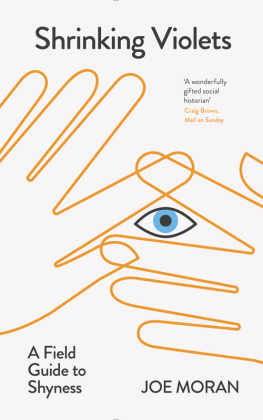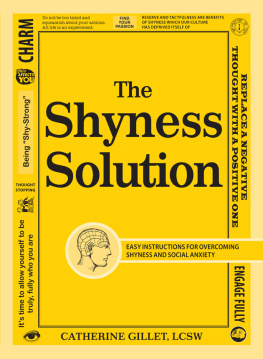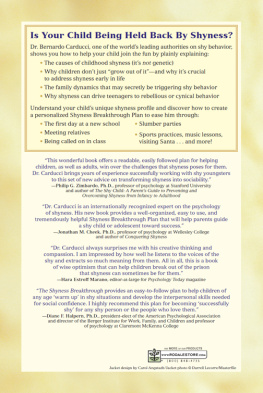SHRINKING VIOLETS
ALSO BY JOE MORAN
Queuing for Beginners
On Roads
Armchair Nation
SHRINKING VIOLETS
A Field Guide to Shyness
JOE MORAN

First published in Great Britain in 2016 by
PROFILE BOOKS LTD
3 Holford Yard
Bevin Way
London WC1X 9HD
www.profilebooks.com
Copyright Joe Moran, 2016
1 3 5 7 9 10 8 6 4 2
Typeset in Sabon by MacGuru Ltd
Printed and bound in Great Britain by
Clays, St Ives plc
The moral right of the author has been asserted.
All rights reserved. Without limiting the rights under copyright reserved above, no part of this publication may be reproduced, stored or introduced into a retrieval system, or transmitted, in any form or by any means (electronic, mechanical, photocopying, recording or otherwise), without the prior written permission of both the copyright owner and the publisher of this book.
A CIP catalogue record for this book is available from the British Library.
ISBN 978 1 78125 263 5
eISBN 978 1 78283 067 2
In memory of my grandmother
Ellen Evaskitas, ne Roberts (19171958)
A TENTATIVE HISTORY
It was October 1939, the start of Michaelmas term. Oxford was at war. College buildings were being commandeered as ARP centres, hospitals and maternity homes for pregnant women evacuated from London. Painted white lines now ran through the archways, quadrangles and courtyards so people could see in the black-out. Air raid shelters made of sandbags and canvas had been hastily raised on college greens.
But a young South African and freshman at Oriel College, David Wright, was barely thinking about the war at all. He was suffering from a shyness so intense that it colonised his waking thoughts and threatened to turn him into a total recluse. Whole days went by without him speaking to anyone. The all-male dining rooms and common rooms now had to be shared with female students turfed out of the womens colleges. Introduced to one, Wright would, he wrote later, shake hands, say nothing whatsoever, slowly but remarkably assume a sunset tinge, and stand there thinking furiously, until such time as the girls nerve broke and she fled.
Wright was lucky. Eventually his boredom got the better of his bashfulness. He resolved to tackle the problem head-on by striking up conversations on trains at a time when carriages were divided into small, closed compartments where it was hard to escape if a stranger trapped you in talk. This high-stakes game led to moments of deep awkwardness, when he imagined the hands of these captive strangers straying towards the emergency cord. No matter: he had begun a lifelong effort to inure himself to social unease. He was resourceful, and joined the college boat club because, although he considered rowing a futile activity, it served as a conduit for social contact. For the same reason he took up bridge, thinking it equally pointless but rightly surmising that the conversation would be easy to join in with because it would always be about bridge.
On graduating in 1942, an aspiring poet, he continued his education in the University of Soho. His tutors were the musicians, artists, writers and Montparnasse exiles who met in the pubs of Dean Street, Old Compton Street and Rathbone Place. This society, united by an interest in art, words and drink, met nightly, fast-tracking acquaintance into intimacy. Wright discovered, like countless timid souls before him, that the symptoms of shyness were relieved by a liquid first concocted about ten thousand years earlier, perhaps for this very purpose: beer.
Wright never shook off his shyness, but he worked round it ingeniously. He became a Soho stalwart and liver-on-his-wits, forever rolling cigarettes assembled from the stubs left in pub ashtrays and startling those in earshot with the odd klaxon blast of laughter. A 6-foot-2 hulk of a man with an unkempt thatch of near-white hair, he even acquired a certain charisma. As poet-in-residence at Leeds University in the mid-1960s, his impromptu seminars in the Fenton pub near the campus attracted hordes of students.
His poetry wry, conversational, urbane, all the things he longed to be but never was in person produced the usual half-shelf of slim volumes but was too modest and well mannered to become widely known. Unlike the great majority of bolder writers, though, he did manage to write something that changed peoples lives: a guide to the Algarve, co-written with the Irish artist Patrick Swift, which introduced middle-class Britons to that region and started the craze for buying second homes there. Wright and Swift were often found together in Soho pubs, silently mouthing words, waving hands and nodding animatedly at each other, oblivious to the baffled looks coming from other pub-goers.
For Wrights shyness was compounded by a much more serious problem. An attack of scarlet fever at the age of seven had left him profoundly deaf. He never worked out whether his deafness caused his shyness or just aggravated it, but he knew that both felt like being marooned from the world. And since he could only lip-read, he had to talk on an un-nuanced level that did not allow for casual interjections or throwaway asides. It made him seem heedless to social niceties: all his time at Oxford he persevered with the strange idea that male undergraduates addressed each other as sir. One aspect of his deafness that he found especially distressing was that it made other shy people embarrassed, for they had to mouth their words exaggeratedly and still risk being misunderstood, adding an extra layer of jeopardy to any encounter.
Deafness prevented him not just from hearing but from overhearing, so he could not judge the mood of a gathering but had to focus on one speaker at a time, manoeuvring for a seat with his back to the light so he could see their faces. Those punctuation marks of normal conversation that nod, eyebrow lift or assenting murmur that shows we are cued in emotionally to our interlocutor were beyond him. The spoken word could never serve for Wright as convivial noise, only as the vehicle for blandly literal meaning.

I am not quite so self-regarding that I imagine my shyness to be a misfortune on a par with deafness. But I do think Wrights predicament suggests, in extreme form, something fundamental about this thing I want to write about, which is that it is about much more than just timidity or fearfulness. Shyness also arises from a kind of social deafness, a tin ear for non-verbal cues, a sense that you have failed to grasp some invisible thread that holds communal life together. It feels like coming late to a party when everyone else is about three beers in and entering that state that allows them to have fluent exchanges that settle on some pre-agreed theme as if by magic.
All my life I have been trying, as Wright did, to make algorithmic what other people seem to find natural. I still cannot dial a new phone number without having written down, like a call centre worker with a corporate script, what I am going to say when the person I am ringing picks up. (It should be a liberation for a shy person to be invisibilised by the telephone receiver, like the Wizard of Oz throwing his voice from behind a screen, but somehow it isnt.) I keep a notebook of things to say to people in case I run out of small talk and however full the notebook gets, it never seems to stop me running out. At parties I no longer look intently at bookshelves or fridge magnets as I used to, but have cultivated a cryptic smile which, I hope, suggests I am benignly amused by the human comedy unfolding before me and unfazed about not being part of it.
Next page



















